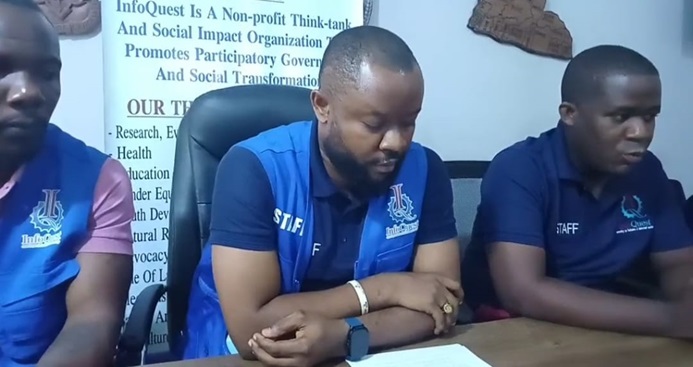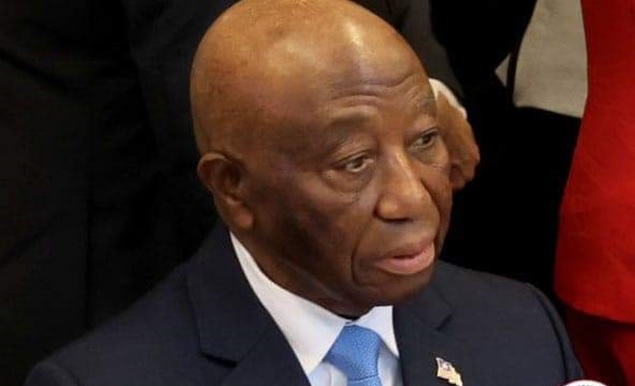MONROVIA, LIBERIA – Matthias Yeanay, the Executive Director of Info Quest Liberia, a civil society organization focused on promoting democratic governance and accountability, expressed deep concern over President Joseph Boakai’s failure to ensure compliance with access declaration regulations among his appointees.
During a press conference held today at the Info Quest Liberia headquarters in Monrovia, Yeanay commended the President for initially declaring his personal assets upon assuming office, which signaled a commitment to transparency. However, he highlighted the President’s failure to publish the details of his access declaration, as well as the alarming revelation that only 75 out of 500 presidential appointees have filed their access declarations.
The National Code of Conduct, enacted in 2014, mandates that public officials declare their income, assets, and liabilities prior to taking office and thereafter. These declarations are to be lodged with the respective authorities and made accessible to the public, the Liberia Anti-Corruption Commission, and the General Auditing Commission for investigative purposes. Yeanay emphasized that the failure of the President’s appointees to comply with these legal provisions undermines transparency and accountability in government, contradicting the President’s campaign promises and betraying the public’s trust.

Info Quest Liberia called on President Boakai to take immediate and decisive action by publicly releasing the complete details of his personal assets declaration, setting an example of true transparency and accountability. They also urged him to issue a clear directive to all appointees to file their asset declarations within a specified timeframe, with failure to comply resulting in disciplinary actions, including suspension and dismissal if necessary. This, they argue, would demonstrate the President’s commitment to upholding the law and ethical conduct in public service.
The failure to enforce compliance with access declaration regulations not only undermines the principles of transparency and accountability but also erodes public trust in the government. President Buakai’s administration must take swift and decisive action to rectify this situation and uphold the values of good governance and ethical conduct.
It can be recalled, the Chairperson of Liberia’s Anti-Corruption Commission (LACC), Cllr. Alexandra Kromah-Zoe, revealed a sluggish trend in asset declaration among Boakai’s government officials, disclosing out of the 500 appointments made by President Joseph N. Boakai, only 75 government officials have declared their assets.
Cllr. Zoe highlighted that the figure is based on LACC’s first-quarter reports, noting that the declarations are from officials in the Executive and Legislative Branches. She emphasized that the annual deadline for assets declaration is the last working day in July 2024, and it is mandatory for all government officials to comply.
Expressing concern over the slow pace of assets declaration, Cllr. Zoe pointed out that Section 10.2(h) of the Amended Code of Conduct stipulates that officials appointed by the President must declare their assets within thirty (30) days of appointment. Failure to comply could lead to immediate suspension from office until full compliance is achieved.
Regarding cabinet members in President Boakai’s government, Cllr. Zoe stated that LACC does not have comprehensive information on whether they have declared their assets. However, a detailed listing will be compiled and published on May 15, 2024.
Cllr. Zoe emphasized that LACC will recommend sanctions against non-compliant public officials and government employees, in accordance with Section 10.3 of the National Code of Conduct. The ongoing assets declaration exercise aims to ensure that all public officials and government employees declare their income, assets, and liabilities in compliance with the law.
The Liberia Anti-Corruption Commission (LACC) is designated as the repository for the asset declaration and verification regime of the Government of Liberia, as per Section 10.2(h) of the Code of Conduct and Section 5.2(o) and Section 4.1(g) of the New LACC Act of 2022. Additionally, Section 10.1 of the Code of Conduct of 2014 requires every Public Official and Employee of Government involved in decision-making to declare their income, assets, and liabilities before taking office.
LACC is currently monitoring compliance and non-compliance with relevant provisions of the law to ensure transparency and accountability among government officials and employees.







